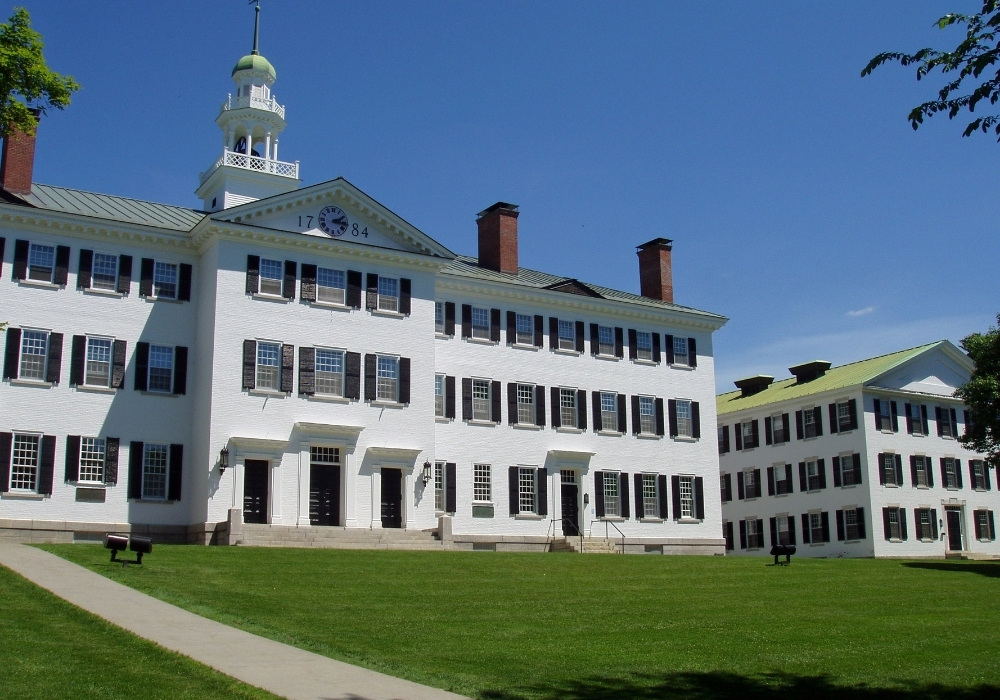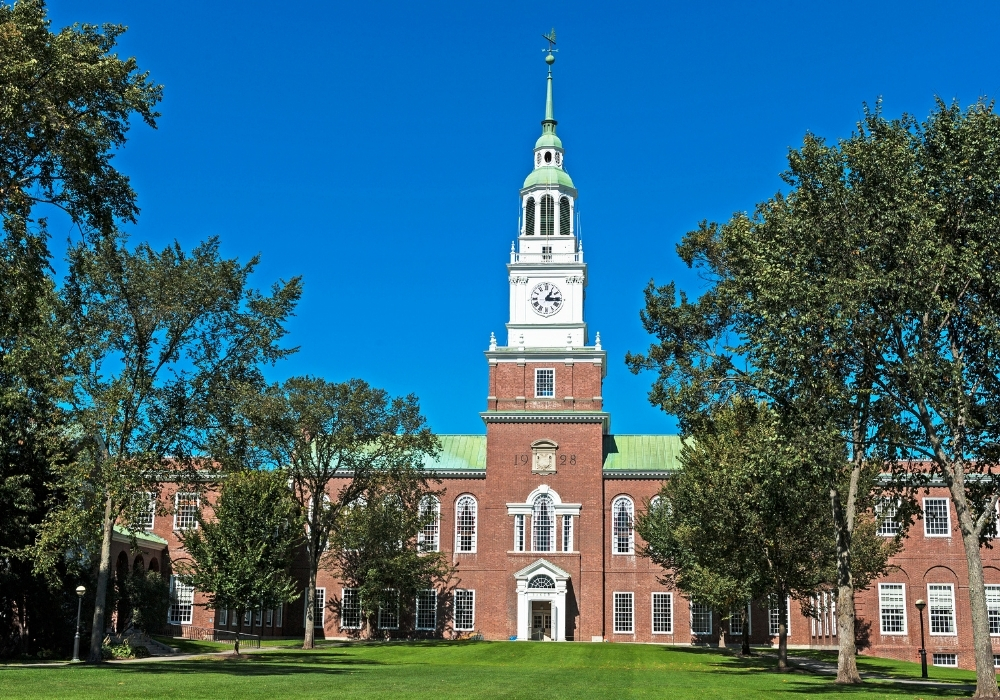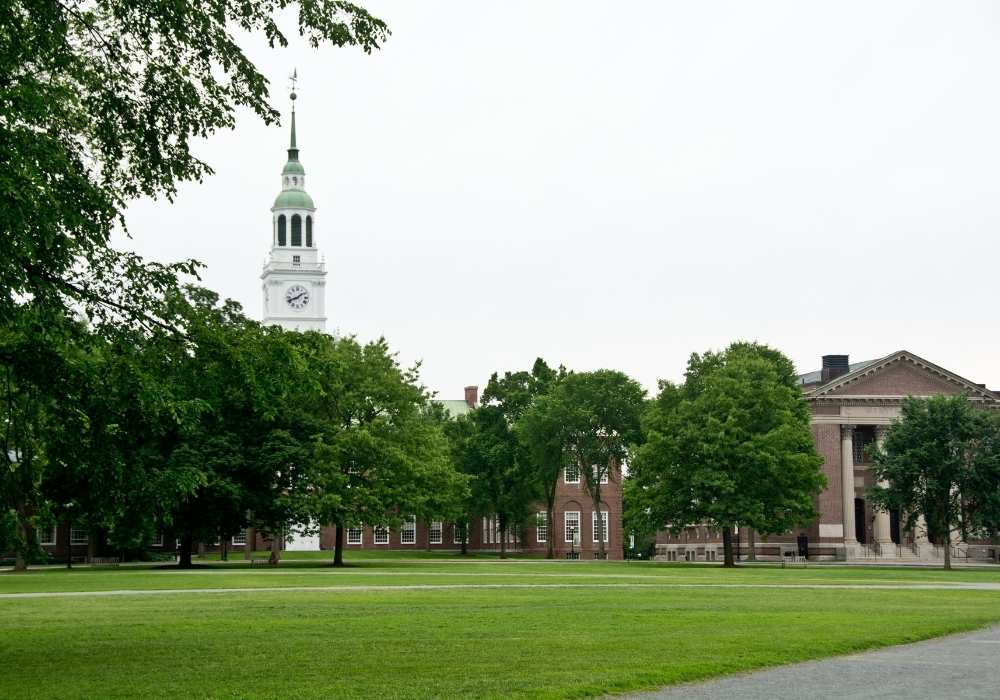The Ivy Scholars guide to Dartmouth College’s culture, admissions, and other essential information for prospective students and their families.
Location: Hanover, New Hampshire
Mascot: Keggy the Keg
Type: Private Research Institution
Population: 6,700 (4,500 undergrad)

Dartmouth College was established in 1769 in Hanover, NH. It is the 9th oldest university in the country and was originally founded to educate Native Americans on English ways of life. It operates on the quarter system and is known for its undergraduate focus and Greek culture. With a somewhat rural and remote campus, Dartmouth students form a close bond, and many clubs have a focus on outdoor activities.

Year Founded: 1769
4 Year Graduation Rate: 86%
Gender Distribution: 50% male, 50% female
Acceptance Rate: 5.4%
Residency: 9% in state, 76% out of state, 15% international
Location Type: Rural
Schedule System: Quarters
Student/Faculty Ratio: 7:1
Average Class Size: 19
Demographics: 50% Caucasian, 18% Other, 15% Asian, 10% Hispanic, 7% Black
US News Rankings:
Independent Rankings:
Application Deadlines:
Notification Dates:
Acceptance Rates:
Average Applicant Pool: 31,600
Average Number of Applicants Accepted: 1, said 700
Average Number Enrolled: 1,200
Application Systems: Common App
Average GPA: 4.11 weighted
SAT Scores: 25th% – 1440, 75th% – 1560
ACT Scores: 25th% – 32, 75th% – 35
*Test mandatory. Writing sections are not required.
Demonstrated Interest:
Dartmouth does not consider demonstrated interest.
Recommendation Letter Policies:
One letter from a counselor, and two letters from teachers are required, ideally from core academic subjects. A peer recommendation is optional, but strongly encouraged.
Dartmouth Essay Prompts:
Special Notes:
Transfer:
Admissions Criteria:
The factors Dartmouth considers very important are: course rigor, class rank, GPA, test scores, essay, letters of recommendation, extracurriculars, and character. They only consider one factor important: talent.
The other factors they consider in an application are: interviews, first generation status, legacy status, geographic origin, race/ethnicity, volunteering experience, and level of interest.
Recruited athletes will have an edge in the admissions process, though they are expected to be within the range of academic success.
What is Dartmouth Looking For?
All applications are examined in a holistic manner. Candidates are evaluated on two 9 point scales (with 9 being the highest). They are given both an academic rating and a personal rating. The personal rating is based on all aspects of the student outside the classroom; their extracurricular involvement, their character, and any unique talents they have. The only candidates who get reviewed by the entire admissions committee are the ones who are uncertain for admissions. Students who are clear admits or denies are treated in a more perfunctory fashion.
Dartmouth wants each student to bring something unique to their campus, in terms of skills, interests and abilities. While they do want all of their students to be high-achieving academically, they also want differentiation in terms of passions and areas of expertise.
Dartmouth’s yield is higher than similarly rated institutions, but lower than much of the rest of the Ivy League, so to better their numbers here, Dartmouth is looking for students who specifically want to attend their school.
Dartmouth has been pushing to improve it’s engineering program for the past few years, and is looking for strong engineering candidates. They are also interested in diversity on campus, with around half their class each year being minorities. They have recently increased recruiting efforts to diversify the geographic origins of their students.
Dartmouth cares less about legacy status than most of the other Ivy League schools, and while it is considered, it is much less impactful.
Dartmouth Strategy:
Dartmouth is one of the less well ranked Ivies, and while it is still a good school, it is constantly striving to compete with the rest of the league, for students and recognition alike. Students who would be competitive at the other Ivies have a better chance of admission to Dartmouth than Harvard or Yale.
The best way to improve chances generally is to apply Early Decision, as Dartmouth, like many top schools, is increasing the number of students admitted ED, due to the higher yield rate. While requirements are not laxer, the overall percentage of students admitted is greater in the early round.
Positioning is key for Dartmouth, as they want to see what each student will bring to campus specifically. A student’s passions and story should be unique to them, and should demonstrate a high degree of success in their chosen specialization. While recruited athletes will have an easier time of this, that is not a good path to take unless a student is truly good at their sport, and nationally competitive.
Pay attention to the supplemental essays. This blog post from the Dean of Admissions at Dartmouth outlines what they are looking for in the essays. For the “Why Dartmouth” essay, they seek to understand what specifically drew you to apply there. Which courses, what emotional connection, what gossamer thread sparked your fancy enough to drive you to apply to Dartmouth. For the other essay, they want to be able to humanize each student, and see who they are outside of grades and test scores. While they don’t say any “right” way to write the essays, whatever you do write should tell the committee something unique about you.
Finally, students who are applying should know and look forward to what they are getting into. Dartmouth has a very rural and isolated campus, and much of what there is to do is therefore focused on the campus itself. They also have an incredibly dominant greek life scene. Make sure you’re comfortable with the thought of life in such a scenario, and don’t apply to Dartmouth just because it has a prestigious name.
Enter your information below and submit for access to the guide.
Schools:
Core Requirements:
Courses of Study:
AP Credit Policies:

Honors Programs:
Research Availability:
Study Abroad:
Business Options:
Pre-Med Options:
Pre-Law Options:
Computer Science Options:
Additional Specialty Programs:
Programs for High Schoolers:

Motto: A voice crying out in the wilderness
Mission and Values:
Residential Housing System:
Dartmouth places incoming students into one of six Housing Communities, which operate similarly to residential colleges. Students are guaranteed housing on campus for their first two years. First year students are clustered together, after first year students can choose from a broader array of options, including Greek housing, affinity housing for students with aligned interests, living learning communities, which are subsets within the residential halls.
Housing Statistics:
Campus & Surrounding Area:
Transportation:
Traditions:
Student-Run Organizations:
Sports:
Greek Life:
Greek Life: 60% of the student body is involved in greek life, including social, service, and academic organizations. The majority of all social life at Dartmouth is through greek organizations.
Nightlife:

Yearly Cost of Attendance:
Financial Aid:
Approximately 59% of Dartmouth students receive some form of financial aid. All funding distributed by Dartmouth is need-based, they do not offer any scholarships due to merit. Almost all aid awards include work-study, this money goes directly to the student to help them pay for incidental costs, such as books and personal expenses.

Ivy Scholars is the leading educational consultant in Sugar Land, Texas, providing admissions coaching, test prep, and more to help students enroll at top tier schools.

Call us now: +1 (281) 215-5148
.
Get expert tips, admissions updates, and resources delivered straight to your inbox.


